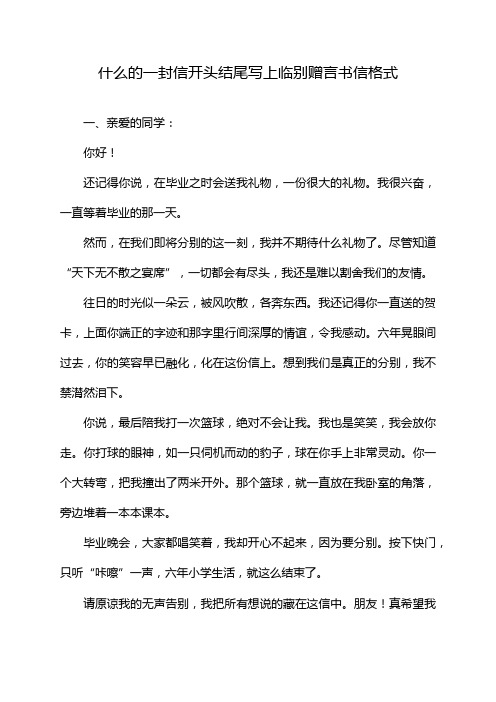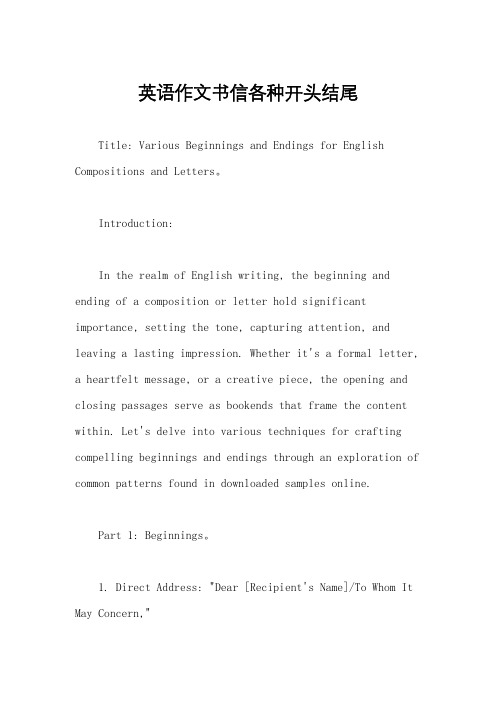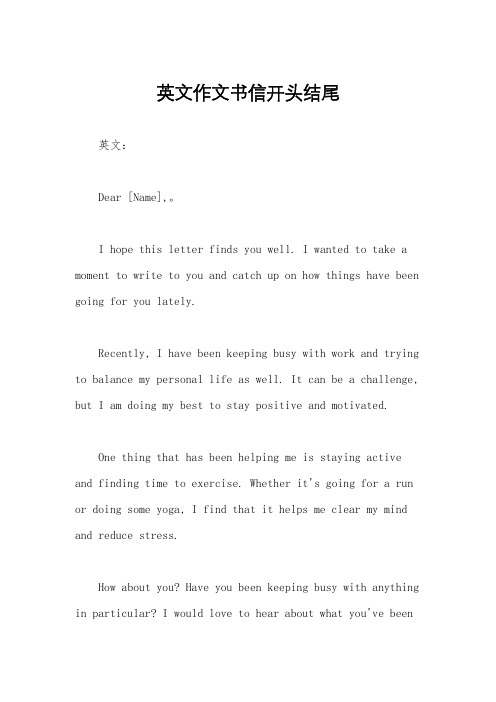书信开头结尾
什么的一封信开头结尾写上临别赠言书信格式

什么的一封信开头结尾写上临别赠言书信格式一、亲爱的同学:你好!还记得你说,在毕业之时会送我礼物,一份很大的礼物。
我很兴奋,一直等着毕业的那一天。
然而,在我们即将分别的这一刻,我并不期待什么礼物了。
尽管知道“天下无不散之宴席”,一切都会有尽头,我还是难以割舍我们的友情。
往日的时光似一朵云,被风吹散,各奔东西。
我还记得你一直送的贺卡,上面你端正的字迹和那字里行间深厚的情谊,令我感动。
六年晃眼间过去,你的笑容早已融化,化在这份信上。
想到我们是真正的分别,我不禁潸然泪下。
你说,最后陪我打一次篮球,绝对不会让我。
我也是笑笑,我会放你走。
你打球的眼神,如一只伺机而动的豹子,球在你手上非常灵动。
你一个大转弯,把我撞出了两米开外。
那个篮球,就一直放在我卧室的角落,旁边堆着一本本课本。
毕业晚会,大家都唱笑着,我却开心不起来,因为要分别。
按下快门,只听“咔嚓”一声,六年小学生活,就这么结束了。
请原谅我的无声告别,我把所有想说的藏在这信中。
朋友!真希望我们能再一起打打闹闹,若是再受伤,也无怨无悔了!也希望我们能再听首歌,《see you again》!请记住:一定要看歌词中文翻译!岁月悠悠,波光明灭。
唯有你依然如旧。
现在,我感到了日子漫长。
待与你重逢之时!xxx日期:二、亲爱的同学:你好!马上就要毕业了,在这毕业之际,我最舍不得的就是同学你了。
我们是在同一天走进的了初中校园,并且有缘还是一同进的教室。
从中学开学的第一天,一直到如今,同学你一直都陪伴在我的身边。
在校园生活里,我们永远都是走在一块的,课间的时候,我们会一起去操场上打球,饭点的时候也会一起冲进食堂。
在校园的学习里,我们也是相互监督,并且共同努力的。
你是我的同学,也是我的朋友。
你是一个贴心的人,在校园生活里,你对的我照顾有很多。
尤其是每次放完假返校的时候,你都会带来很多的家乡特产,你会分给班上的同学一起吃,也还会特意给我留上不少。
你可能不知道,每次我一看到你特意给我留下来的食物时,我心里可是开心的不得了。
英语书信作文开头结尾

英语书信作文开头结尾 Dear [Recipient's Name],。 I hope this letter finds you in good health and high spirits. I am writing to you today to discuss [topic of the letter]. I believe it is important to address this matter as it holds great significance in our lives.
[Provide background information or context about the topic]. This issue has caught my attention due to its impact on our society and the potential consequences it may have for future generations. Therefore, I feel compelled to express my thoughts and concerns regarding this matter.
[Present your main arguments or points]. Firstly, it is crucial to acknowledge that [state your first argument]. This is supported by [provide evidence or examples]. Furthermore, [present your second argument]. To illustrate this point, [provide evidence or examples]. Lastly, [state your third argument]. This is evident through [provide evidence or examples]. In light of the aforementioned points, I strongly believe that [state your position or recommendation]. It is imperative that we take action to address this issue promptly. I propose that [provide your proposed solution or course of action]. By doing so, we can [explain the positive outcomes or benefits of your proposal].
应用文写作书信经典开头结尾

一、开头1.开门见山式①(2017·全国卷Ⅱ书面表达)I am writing to invite you to attend the Chinese paper-cutting art exhibition to be held in the art gallery from 8:00 am to 5: 00 pm next Sunday in our city center.②(2018·全国卷Ⅰ书面表达)How are you doing?Learning that you are about to pay a visit to a Chinese friend and confused about the Chinese customs,I'm writing to inform you of some relevant details.③(2016·全国卷Ⅱ书面表达)Our school photography club is going to hold an International High School Student Photography Show.④I'd like to ask you to write an article for our school's English newspaper.⑤I'd like to invite you to join us for a visit to the nearby nursing home next Saturday for the Double Ninth Festival.2.自我介绍式①I'm Li Hua, a student from Class 2, Grade 3. I'm writing to apply for the position as a student volunteer.②This is Li Xia. I learned from your post that you want to improve your Mandarin.3.询问问候式①(2017·全国卷Ⅲ书面表达)How is everything going? I have good news to tell you that our school's table tennis team is recruiting new members.②(2018·全国卷Ⅱ书面表达)How are you doing these days?You asked me about how our school performs our PE classes in your last letter,so I'm writing to share with you some details.4.情感表达式①(2018·全国卷Ⅰ书面表达)I am delighted to know you are invited to a dinner party by your Chinese friend.②(2017·北京卷书面表达)I'm happy to receive your letter and know you are coming to China.③(2016·全国卷Ⅲ书面表达)I am sorry to say that I cannot go to the bookstore with you on Friday afternoon.④(2016·北京卷书面表达)It's great to hear from you. I feel proud knowing your interest in Chinese history.⑤(2016·天津卷书面表达)How time flies! Two weeks went by, and our exchange activities ended. On behalf of my school, I would like to express my feelings.在书信开头我们可用I'm writing to do sth.来表达目的;用I'd like to do sth.来表示打算。
英语作文书信各种开头结尾

英语作文书信各种开头结尾Title: Various Beginnings and Endings for English Compositions and Letters。
Introduction:In the realm of English writing, the beginning and ending of a composition or letter hold significant importance, setting the tone, capturing attention, and leaving a lasting impression. Whether it's a formal letter, a heartfelt message, or a creative piece, the opening and closing passages serve as bookends that frame the content within. Let's delve into various techniques for crafting compelling beginnings and endings through an exploration of common patterns found in downloaded samples online.Part 1: Beginnings。
1. Direct Address: "Dear [Recipient's Name]/To Whom It May Concern,"Example: "Dear Mr. Smith,/To Whom It May Concern, I am writing to express my sincere gratitude..."2. Anecdotal Opener: Begin with a short story or personal anecdote related to the main theme of the composition.Example: "It was a cold winter evening when I first met her. The snow was falling softly outside, and her warm smile illuminated the room..."3. Quotation or Famous Saying: Start with a relevant quote or saying that sets the mood or provides context for the topic.Example: "As Albert Einstein once said, 'Imagination is more important than knowledge.' These words resonate deeply with me as I embark on this journey of exploration..."4. Rhetorical Question: Pose a thought-provokingquestion that encourages the reader to reflect on the topic.Example: "Have you ever wondered what it truly means to be courageous? Is it the absence of fear, or the ability to act in spite of it?"5. Description of Setting: Paint a vivid picture of the scene or environment to immerse the reader in the narrative.Example: "The sun hung low in the sky, casting long shadows across the deserted beach. The gentle sound of waves crashing against the shore provided a soothing backdrop to our conversation..."Part 2: Endings。
英语信件开头结尾万能句子(精选122句)

英语信件开头结尾万能句子精选122句1. It goes without saying that... 不用说...(意思是:论述的内容是显而易见的)2. 完全同意……这种观点(陈述),主要理由如下:3. 关于……人们有不同的观点。
一些人认为……4. 落款5. He has a small room to _____.6.根据图表/数字/统计数字/表格中的百分比/图表/条形图/成形图可以看出……。
很显然……,但是为什么呢?7. How is it going?最近怎么样?8. 写作目的9. 致谢10. 如何写建议信的结尾11. Please write to us by tonight's mail, without fail.12. 拒绝邀请13. We trust you will favor us with an early (prompt) reply.14. _____ takes two to make a quarrel.15. 问候16. Was _____ you that broke the window?17. 综上所述,我们可以清楚地得出结论……18. Let’s keep in touch.19. A prompt reply would help us greatly.20. You asked me about(+problem question 等),now let me give you someadvice.你在来信中询问我。
.,现在,让我给你一些建议。
21. May we remind you that we are still awaiting your early reply.22. _____ do you mean?23.在总体上很难说……是好还是坏,因为它在很大程度上取决于……的形势。
然而,就我个人而言,我发现……。
24.现在,……,它们给我们的日常生活带来了许多危害。
英文作文书信开头结尾

英文作文书信开头结尾英文:Dear [Name],。
I hope this letter finds you well. I wanted to take a moment to write to you and catch up on how things have been going for you lately.Recently, I have been keeping busy with work and trying to balance my personal life as well. It can be a challenge, but I am doing my best to stay positive and motivated.One thing that has been helping me is staying active and finding time to exercise. Whether it's going for a run or doing some yoga, I find that it helps me clear my mind and reduce stress.How about you? Have you been keeping busy with anything in particular? I would love to hear about what you've beenup to.Take care and I look forward to hearing from you soon.Sincerely,。
[Your Name]中文:亲爱的[姓名],。
希望这封信能够找到你,你最近过得怎么样?我想写信给你,了解一下你最近的情况。
最近,我一直在忙于工作,同时也在努力平衡我的个人生活。
虽然有些挑战,但我正在尽力保持积极和有动力。
英语作文万能句子开头和结尾书信
英语作文万能句子开头和结尾书信在英语作文中,书信写作是常见的形式之一。
合适的开头和结尾能够为信件增添亲切感和礼貌感,也能够提高整体的书面表达水平。
下面是一些在英语书信中常用的万能句子开头和结尾:开头句子:1.Dear [Recipient’s Name],2.I am writing to inquire about…3.I am writing to express my concern about…4.I am writing to inform you that…5.I hope this letter finds you well.6.It’s been a pleasure knowing you for…7.With reference to our recent conversation…8.Thank you for your letter regarding…结尾句子:1.I look forward to hearing from you soon.2.Thank you for your attention to this matter.3.Sincerely,4.Best regards,5.Yours faithfully,6.Please do not hesitate to contact me if you need any furtherinformation.7.I appreciate your prompt response.8.Thank you for your time and consideration.以上是一些常用的书信开头和结尾的万能句子,希望对您的英语书信写作有所帮助。
在写作书信时,选择合适的开头和结尾句子能够使您的信件更加得体和专业。
祝您在英语写作中取得好成绩!希望这篇文章能帮助您在书信写作中找到适合的开头和结尾句子。
祝您在英语写作中取得更大的进步!。
写信格式范文(精选6篇)
写信格式范文1一、称呼:要根据写信人与收信人之间的关系来决定。
例文的作者是写给表姐“小溪”的,所以称呼是“小溪姐姐”。
小学生与收信人的关系大体可分为两种:自己与长辈,自己与平辈。
如果是长辈亲属,只写称谓即可,如“姑妈” 、“舅舅”等,不必写姓氏;如果不是亲属,则应在称呼前加上姓氏或姓名,如“xxx”、“xxx叔叔”等。
平辈之间,一般要在称呼前加上姓名或名字,如“xxx同学”、“欣xxx妹妹”等。
还可以在“称呼”前加上“尊敬的”“想念的”等修饰词语,表达自己对收信人的某种感情。
称呼是书信的开头,要顶格写。
称呼后面要加冒号。
二、问候语:如果收信人是长辈,可以写“您好”;或“身体好吗”等;如果收信人是平辈,可以写“你好”;如果收信人不是一个人,一般写“你们好”或“大家好”,不可以写“您们好”(“您”后面不能加“们”)。
问候语另起一行,空两格写。
三、正文:这是书信的主要部分,要直截了当地把要告诉对方的内容条理清楚地写下来,要写出真情实感。
如果要说的事情不止一件,应每件事写一段。
书信不要使用华丽的词语,更不能言不由衷。
正文可以紧接问候语写,也可以另起一行空两格写。
四、祝愿语:正文写完后,通常要向对方表示致敬或祝福。
另起一行,空两格写“此致”或“祝你”,再另起一行顶格写“敬礼”或“健康”等祝福的话。
同学之间,祝愿语可以写“祝你学习进步”之类的内容。
五、署名:在信纸的右下方写上自己的名字,前面还可以注明自己的身份,如“学生xx x”、“侄儿宏洋”等。
六、日期:把写信的具体时间写在署名的正下方,应写清年月日(不写年份是错误的),以备收信人日后查阅。
写完信,填写好信封,贴足邮票,就可以寄出了。
(例文):你好!现在已经到了冬季,咱们的家乡又变成了银色的世界。
加拿大那里的气候怎么样?也很冷吗?听妈妈说,你下个月就要回国了,到时请你一定到我家来,好吗?我还在绘画班学习呢。
前几天,我的一幅画在“中美少年儿童环境美术书法摄影比赛”中得了一块银牌,为学校争了光。
书信开头结尾常用表达方式
写作开头结尾常用表达方式1. 一般开头How is everything going with you? I am writing to extend my heart-felt thanks to you for …(感谢)Thank you for your letter of February 8 informing me that I have been accepted by your college. But I must apologize to you for… (道歉)I am writing to inform you that ... (通知)I am writing to seek your assi stance in… to request to(请求)I am writing to express my views on … (建议)I am writing in response to your… (回应)I am writing to apply for the scholarship that your department offers to students from other countries. (申请)I am writing to see if it is possible for you to provide me with information regarding…(咨询)I am writing to express my disappointment/dissatisfaction about … to complain about …(抱怨)I am writing to lodge a claim for the suitcase I lost on my journey to … (挂失)I have learned from…that you are looking for …. And I am writing to recommend …for the post.(推荐)补充句型:I am writing this letter for the purpose of doing sth. (较为正式)2. 表达感谢的句型I am most grateful to you for your…I am writing this letter to express my sincere gratitude for…I would like to convey in this letter my heartfelt thanks for…I feel greatly indebted to you for ….I am writing to tell you how greatly I appreciate all you have done for me.But for your kind assistance, I would have …I must thank you again for your generous help.My thanks to you for you generous help are beyond words.Please accept my deepest gratitude.3. 表达道歉的句型I feel really sorry to you for …I must apologize to you for…I would like to express my deepest apology/regret for not being able to …Had I …, I would have…I want you to know how badly I feel about…4. 一般结尾Any favorable consideration on my application/requests will be highly appreciated.I am looking forward to your favorable reply at your earliest convenience.。
高中英语书信作文开头和结尾
高中英语书信作文开头和结尾It was a warm summer day when I sat down at my desk to write a letter to my dear friend, Emily. The sun was shining through the window, casting a gentle glow over the pages in front of me. As I dipped my pen into the inkwell, I couldn't help but feel a sense of excitement and anticipation. Writing letters has always been a cherished pastime of mine, and this particular letter held a special significance.Emily and I had been best friends since our early days in high school. We had shared countless memories together, from laughter-filled sleepovers to bittersweet moments of heartbreak. Through it all, our bond had only grown stronger, and I knew that she was the one person I could always count on to understand me, to listen without judgment, and to offer the kind of wisdom and support that only a true friend can provide.As I began to write, the words flowed effortlessly from my pen. I wanted to start by expressing how much her friendship meant to me, how her unwavering presence in my life had been a constant sourceof comfort and strength. I reminisced about the times we had spent together, the inside jokes we shared, and the way we could always count on each other to be there, no matter what.I told her about the ups and downs I had been experiencing lately, the challenges I had faced both in my personal life and in my academic pursuits. I knew that she would listen with an open heart and offer her genuine, heartfelt advice. Her perspective had always been invaluable to me, and I treasured the way she could always see the bigger picture, even when I was caught up in the details.As I continued to write, I found myself reflecting on the journey we had taken together, from the nervous, uncertain teenagers we had once been to the confident, resilient young women we were becoming. I marveled at how much we had grown and changed, and yet how our core values and our unwavering friendship had remained a constant in our lives.I expressed my gratitude for her unwavering support, her willingness to lend an ear, and her ability to make me laugh even on my darkest days. I told her how much I admired her strength, her resilience, and her ability to navigate the complexities of life with such grace and wisdom. She had been a true inspiration to me, and I knew that our friendship would continue to be a source of strength and comfort for years to come.As I neared the end of my letter, I felt a sense of warmth and contentment wash over me. I knew that the words I had written were a true reflection of the depth of my feelings for Emily, and I hoped that they would convey the immense gratitude and appreciation I felt for her presence in my life.I ended the letter by expressing my hope that we would soon be able to see each other in person, to catch up over a cup of tea and to continue building the strong, unbreakable bond that had sustained us through so much. I told her that I missed her dearly and that I couldn't wait to hear her voice and to see her beautiful smile once again.As I sealed the envelope and placed it in the mailbox, I felt a sense of peace and fulfillment. Writing this letter had been a cathartic experience, a way for me to express the depth of my feelings and to celebrate the incredible friendship that we had built over the years. I knew that no matter what the future held, Emily would always be a constant in my life, a true and loyal friend who would walk beside me every step of the way.。
- 1、下载文档前请自行甄别文档内容的完整性,平台不提供额外的编辑、内容补充、找答案等附加服务。
- 2、"仅部分预览"的文档,不可在线预览部分如存在完整性等问题,可反馈申请退款(可完整预览的文档不适用该条件!)。
- 3、如文档侵犯您的权益,请联系客服反馈,我们会尽快为您处理(人工客服工作时间:9:00-18:30)。
收到来信:颁来手示,诵悉一切;承赐教言,十分感激;大示拜读,心折殊深;得奉云翰,不胜感戴大札拜读,敬佩之至;大函细读,尊意俱悉;得聆教益,如坐春风; 得书之喜,喜不自胜;奉展芳翰,如见玉颜;忽得兰言,欣喜若狂;华翰先颁,甚忍下怀;惠示奉悉,如亲威颜;兹蒙惠书,无限感激;昨接云朵,聆悉一切;接奉环云,慰如心颂 ;昨接还翰,喜悉一切。 时间飞逝:白驹过隙,寒暑三度 ;光阳似箭,日月如梭;春风东去,夏风南来; 光阴荏苒,时序频迁;人间岁改,天上星回; 时光流水,日月飞梭;寒暑易节,春秋换季; 岁月不居,时节如流;岁月荏苒,裘葛几易; 岁月易得,弹指人生;岁月易逝,十载一瞬; 岁月难驻,人生易老;物换星移,春秋三度。 倾诉思念:故园代切,梦寐神驰; 别来良久,甚以为怀;别后萦思,愁肠日转; 多日不见,孺念甚殷;海天在望,不尽依依; 春雨霏霏,思绪绵绵;海天相望,思念切切; 离情别绪,耿耿于怀;握别以来,深感寂寞; 遥隔云山,久疏音问;心路咫尺,灵犀相通; 一别累月,思何可支;自别芝晖,思念殊深; 一日不见,如隔三秋;频年不晤,渴想良深; 秋水伊人,怀念不已。 道歉请谅:抱歉之情,莫可言表; 久未请安,深以为歉; 满腔歉意,寤寐难安;久疏问候,抱歉良深; 夙夜抚怀,殊深歉仄;屡未奉答,歉甚愧甚; 未能践约,抱歉良深。 言犹未尽:情长纸短,不尽依依 ;书不尽意,余言后叙;书何尽言略陈鄙陋; 书未尽情,余候面叙;书不尽怀,余候后禀 ;楮墨有限,不尽欲言;言不尽思,再祈珍重 。
受人深恩称 “雨露之恩”。 谢人恩泽称 “河润”。 感救命恩称 “再造”、“没齿不忘”。 感德难忘称 “铭心镂骨”。 知恩必报称 “结草衔环”。 请人看稿称 “阅示”、“阅批”。 请人改稿称 “斧正”。 请人评论称 “指教”、“指点”。 请人指路称 “请问”、“借问”。 请人解惑称 “指导”、“赐教”。 受人教导称 “茅塞顿开”。 受人益言称 “药石”、“箴规”。 求人办事称 “拜托”、“鼎助”。 请求解难称 “恳求”、“恳请”。 请人回信称 “敬祈示复”。 谢人寄信称 “辱承华翰” 央人协助称 “麻烦”。 麻烦他人称 “打扰”。 请人原谅称 “包涵”、“海涵”。 望人恕罪称 “宽宥”。 伴人受益称 “借光”。 伴人享受称 “伴福”。 谢人致问称 “多蒙寄声”。 赞襄其事称 “玉成”。 托人这事称 “借重鼎言”。 贺人荣归称 “锦旋”。 称人生日称 “初度之辰”。 献人年高称 “齿德俱尊”。 贺人喜庆称 “恭喜”。 自谦礼少称 “献芹”、“菲仪”。 不受债赠称 “反壁”。(回称:“微忱勿却”) 送行之礼称 “赆仪”。 吊唁之礼称 “奠仪”。 结婚之礼称 “喜仪”。 留位待贤称 “虚左以待”。 物归原主称 “完璧归赵”、“璧还”。 借物归还称 “奉还”。 赞人貌美称 “冠玉”。 出人群者称 “巨擘”。 你我同心称 “金兰”。 事有奇缘称 “三生有幸”。(回称:“天与人赐”) 自提意见称 “浅见”、“肤见”。 代人作事称 “代庖”。
释例: 河 润:谓施惠及远,犹河流之浸润。《庄子.列御寇》:“河润九里,泽及三族。” 再 造 :犹言再生。《宋书.王僧达传》:“再造之恩,不可妄属”。 反 璧 :《左传.僖公二十三年》:“乃馈盘餐,置璧焉,公子受餐反璧。”后不受馈赠为反璧。 赆 仪:赆即赠人路费或礼物。《孟子.公孙丑下》:“予将有远行,行者必以赆。”所以送行礼物称为赆仪。 冠 玉:饰在帽上的美玉。《史记.陈平世家》:“平虽美丈夫,如冠玉耳!”后多用以形容男子之美貌。 巨 擘 :大指拇,比喻特出的人物。《孟子.滕文公下》:“于齐国之事,吾必以仲子(陈仲子)为巨擘焉!” 金 兰:谓友情契合、同心。语出《易.系辞上》:“二人同心,其利断金。同心之言,其臭(气味)如兰。”故谓之金兰。
周教授向学生介绍了书信的格式和方法。他说,书信的成分有称谓语、提称语、思慕语、正文、祝愿语和署名六个部分。 据周教授介绍,书信中敬称称呼对方表明尊重。可以用古代的爵称,君、公等,也可在称谓前加敬字,或者称字和号。对于一些我们非常敬仰的有一定学术地位的长者,比如社科院的庞朴先生,学术界一般都称他为庞公。夫人这个词是专用来称对方或他人妻子的,绝对不能称呼自己的妻子为我夫人。称呼对方的儿子为令公子,也称令息,息就是子息的意思。称对方为贤兄、仁兄、台甫、台鉴。一般来说称对方的字号比称名字尊重。他还举例说,电视剧《铁齿铜牙纪晓岚》中纪昀和纪晓岚混称是错的。
周教授还特别强调了书信中绝对不能出现我你他字样,如果非要用就需要用一些词代替。比如“你”可以称为某某仁兄,某某砚兄或称阁下。他举例说,他有一位同学是北大的博士,和女朋友第一次鱼雁传书,那女孩在信封上也称他为某某砚兄。在信中称自己应该为在下、小弟。信中的“他”应该用“渠”来代替。
周教授说,古人“自谦而敬人”的做人原则在书信中表现为对别人用敬称的同时自己用谦称。比如古代皇帝都称孤道寡,这就是谦称。称自己的妻子为内子、内人、拙荆,绝对不能说夫人。称自己给别人的东西应该用“菲”、“芹”、“寸”、“薄”。比如薄酒一杯,聊表芹献。请人家吃饭叫做略具菲酌。 常用书信套语 提称语,用在对方称呼后面,表示尊敬—— 父母:膝下、膝前、尊前、道鉴 长辈:几前、尊前、尊鉴、赐鉴、道鉴 师长:函文、坛席、讲座、尊鉴、道席、撰席 平辈:足下、阁下、台鉴、大鉴、惠鉴 同学:砚右、文几、台鉴 晚辈:如晤、如面、如握、青览 女性:慧鉴、妆鉴、芳鉴、淑览 -祝愿语—— 父母:恭请福安 叩请金安 长辈:恭请崇安 敬请福祉 敬颂颐安 师长:敬请教安 敬请教祺 敬颂海安 平辈:顺祝 署名—— 对长辈:叩禀 敬叩 拜上 对平辈:谨启 鞠启 手书 对晚辈:字示 白谕 -礼仪作用 E-mail该有传统书信礼仪 学习中国传统书信礼仪,可以使我们在不能见面的时候,从字里行间体现出揖让进退。此外,虽然现在很多人都不注重书信礼仪,但在我国港台、韩国日本以及华侨地区依然保留着最传统的书信礼仪,掌握基本的书信礼仪不仅有助于提高个人文化礼仪素养,而且还有助于增进交流。 周教授收到过很多韩国和日本友人或者我国港台学者的来信,他们都非常讲究书信礼仪。比如一位韩国朋友写信中有“将命考”的字样,周教授问他的学生,他们都不知道这是什么意思,其实就是一种自谦,不敢给您写信只好给传命的人,“将命”是指传命的人,“考”是副手,这句话的意思是给您传达室的人的副手,可谓谦而又谦。周教授珍藏一封钱穆先生夫人给他的信,除了抬和阙以外,还有很多传统的书信格式。她写道,匆匆不及所言,并候双安,又称他们夫妻为俪,这封信充分体现了传统书信礼仪。此外我们还可以看看鲁迅写给母亲的信和毛泽东写给老师的信,可以体会出中国传统礼仪的魅力所在。
现在人写信的机会越来越少,大多数人都用E-mail,但其实一些基本的原则比如书信的结构敬语称呼等还是应该和传统书信一样的。学会写信是一种文化素质和个人涵养的最基本体现。
原来我不会写信 人艺术院一位女生:我学了这么多年中文,现在才发现其实我连一封信还都不会写,也不知道写信原来有这么多讲究。我平时很少写信,最多不过就是发个EMAIL,也不讲求格式。不过现在觉得书信礼仪还是非常重要的,应该好好学习一下,有的时候我读到名人书信中有些地方看不懂也没有注意,其实这些细枝末节也是中国传统文化的表现。另外,一封措词得体恰当的信也反映出个人修养。连一封信也写不好,会让人笑话我这个学中文出身的人。\u0013
-不用完全照搬 经管学院一位男生:我觉得很长知识,书信是一种礼仪和文化,学习书信礼仪可以增加个人修养和文雅气质。我觉得了解书信礼仪是很重要的,但并不说明我们就要完全照搬,因为真的完全写旧式书信会有掉书袋的嫌疑。有一些过于复古的东西不太适用了就应该被改进或者抛弃,只要有一套大家都接受和认可的书信礼仪就可以了。在书信礼仪这个问题上,我们保持尊敬别人和谦虚的传统是最重要的
-去信别让人“跪启” 周老师举了很多现实生活中的例子。 有一个学生给父母写信:“敬爱的爸爸妈妈我钱不够用了。”一点拐弯都没有,应该先委婉问候一下,说,“敬爱的爸爸妈妈天气暖和了,可是有的时候还很凉,一定要注意增减衣服,保重身体”等等,然后再说“我的钱不够用了”。
一个男孩收到一封女孩来信,很激动,但一看提称语,上面写某某跪启,本来还想说一句有文彩的话,可是让别人跪着看信,实在是欺人太甚。
-名人书信 鲁迅致母亲: 母亲大人膝下,敬禀者,日前寄上海婴照片一张,想已收到。小包一个,今天收到了。酱鸭、酱肉,昨起白花,蒸过之后,味仍不坏;只有鸡腰是不能吃了。其余的东西,都好的。下午已分了一份给老三去。但其中的一种粉,无人认识,亦不知吃法,下次信中,乞示知。上海一向很暖,昨天发风,才冷了起来,但房中亦尚有五十余度。寓内大小俱安,请勿念为要。海婴有几句话,写在另一张纸上,今附呈。 专此布达,恭请 金安。 男树叩上广平及海婴同叩 一月十六日
毛泽东致老师符定一(澄宇)先生 澄宇先生夫人道席: 既接光仪,又获手示,诲谕勤勤,感且不尽。德芳返平,托致微物,尚祈哂纳。世局多故,至希为国自珍。
肃此。敬颂 教安。 不具。
书信是人们生活中最为普通、最为古老的一种沟通方式。 书信和格式:信文由称谓、正文、敬语、落款及时间四部分组成。 称谓:应在第一行顶格写,后加冒号,以示尊敬。称谓应尊循长幼有序、礼貌待人的原则,选择得体的称呼。
正文:正文是信函的主体。可以根据对象和所述内容的不同,灵活地采用不同的文笔和风格。 1、问候语:问候语要单独成行,以示礼貌。有“你好”、“近好”、“节日好”等。 2、先询问对方近况和谈与对方有关的情况,以表示对对方的重视和关切。 3、回答对方的问题或谈自己的事情和打算。
